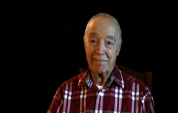6:48 | The lack of food was the worst part of life in a German POW camp, says Ed LaPorta. On the positive side, they were able to get orchestra instruments and put on plays, but more importantly, they were able to tunnel out and secure more valuable things, like parts for a radio.

His wanted to be an engineer like his Sicilian father, but more than that, Ed LaPorta wanted to join the war effort so he volunteered. Experienced in mechanics and truck driving, he was sent to the 1st Armored Division and shipped out for North Africa.
When the troops hit Casablanca, there was no opposition, but along the coast at Oran, it was a different story. Ed LaPorta had the landing craft blown out from under him, but thanks to his training, he made it to shore. By the time the German fortress was knocked out, his company had suffered 80% casualties.
When the advance across North Africa began, the French were fighting with the Germans, recalls Ed LaPorta. That soon changed and the Nazis' other allies, the Italians, had no heart for the fight. It was still a struggle, and as German planes strafed mercilessly, LaPorta went to the aid of a wounded man.
There were no medics around when Ed LaPorta caught some shrapnel in his leg, so he dug it out himself and bandaged it up. He was chasing Rommel's army with the 1st Armored Division and having success by analyzing the strategies of the enemy.
According to Ed LaPorta, there are three things that can happen on a reconnaissance mission and only one of them is good. That wasn't what happened when he was captured by Rommel's troops and beaten by an interrogator from Chicago.
"This is war! We don't care about the Geneva Convention!" That's what the German officer said to Ed LaPorta and the rest of the American POWs as they prepared to serve as laborers. This backfired when the Americans began sabotaging the artillery shells they were carrying.
Someone was punished every time a demand was made, but the American POWs eventually got everything they wanted. Thanks to the Geneva delegate and the iron will of the prisoners, they got blankets, baseball equipment and lumber for a chapel. They even smuggled in a rabbi for services.
The first step was getting a camera. Then, the POW's had to get film and a way to develop it. Once that was done, recalls Ed LaPorta, they could get a picture of a German guard accepting cigarettes. That was insurance.
It was a forced march to a different Stalag and Ed LaPorta refused to leave his sick friend behind where he faced certain death. He carried him for eighty five miles so he could live to see the baby daughter he'd never seen. The destination was Buchenwald, where you could still smell the ovens.
The Russians had liberated them but when they were told they were going to Russia, the answer from the GI's was swift, "No way!" An American convoy caused the Russians to back off and the destination became Camp Lucky Strike and then, the Statue of Liberty.
You don't want to mess with a newly liberated POW. Ed Laporta had to dress down an imbecilic MP when he arrived back in the states and not long after, could be seen leaping over a steam table to get at a non-compliant German prisoner who was serving the food.